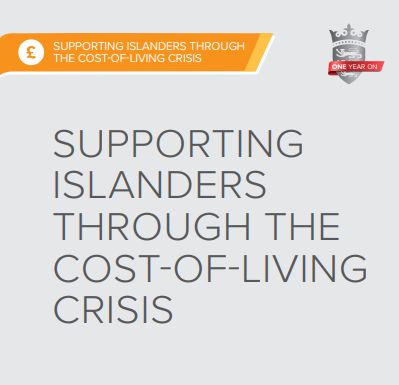What’s the difference between cost of living and inflation?
The cost of living refers to the amount of money required to sustain a certain standard of living, including expenses such as housing, food, transportation, and healthcare. It varies depending on location, lifestyle, and individual preferences.
While the cost of living considers specific expenses, inflation reflects the overall rise in prices across the economy over time.
What is the cost of living crisis?
When household expenses rise without a commensurate increase in the amount of money coming in, leading to an adjustment in lifestyle choices.
Government has sought to help by introducing measures designed to increase the amount of money coming into households (by reducing tax demands and increasing the support available to specific groups), by encouraging landlords to refrain from rent increases, and by encouraging Islanders to think about how they can shop around.
Is there a difference between the UK’s cost of living crisis and Jersey’s?
Yes. In Jersey, the biggest issue has been the cost of housing while in the UK cost of living has focused on rises in energy prices and taxes. The levers available to the UK and Jersey governments to help people are also different.
Why is economic growth considered good?
Economic growth leads to increased employment opportunities (it often results in job creation and reduced unemployment rates); higher incomes (businesses expand and generate higher profits, leading to increased wages) and improved living standards (higher wages enable access to better healthcare, education, education and infrastructure) and contribute to reduced poverty rates.
Economic growth can spur innovation and technological progress, leading to new industries, improved productivity, and advancements that benefit all society.
What happens to the economy when people get a pay rise?
Often pay rises lead to increased disposable income, resulting in greater consumer spending which, in turn, leads to greater demand for goods and services, stimulating economic growth and boosting businesses. It can also lead to greater savings and investment (which can provide capital for businesses and stimulate economic growth in the long run)
If wage increases are not accompanied by corresponding increases in productivity, businesses may pass on the increased labour costs to consumers, potentially contributing to inflation.
Why do mortgage rates go up with the Bank of England base rate rises?
The Bank of England (BoE) is responsible for setting the base interest rate in the United Kingdom, which serves as a benchmark for borrowing costs in the economy. When the BoE raises the base rate, it tends to have a direct impact on mortgage rates because it becomes more expensive for banks to borrow money from the central bank. To compensate, banks often raise interest rates on loans, including mortgages.
How do we lower inflation?
Lowering inflation typically requires a combination of measures. They can include:
- Monetary policy: central banks increase interest rates to reduce borrowing and spending, which can help cool down the economy and lower inflation
- Fiscal policy: Governments reduce their spending or increase taxes to reduce overall demand in the economy, helping to curb inflation.
- Supply-side policies: Governments introduce measures to increase productivity, reduce production costs, and promoting competition.
- In extreme cases, governments may impose temporary controls to directly limit price and wage increases. Such measures are often seen as distortive and can have unintended consequences.
This information has been provided by the Economy Department, Government of Jersey.
 blog.gov.je
blog.gov.je